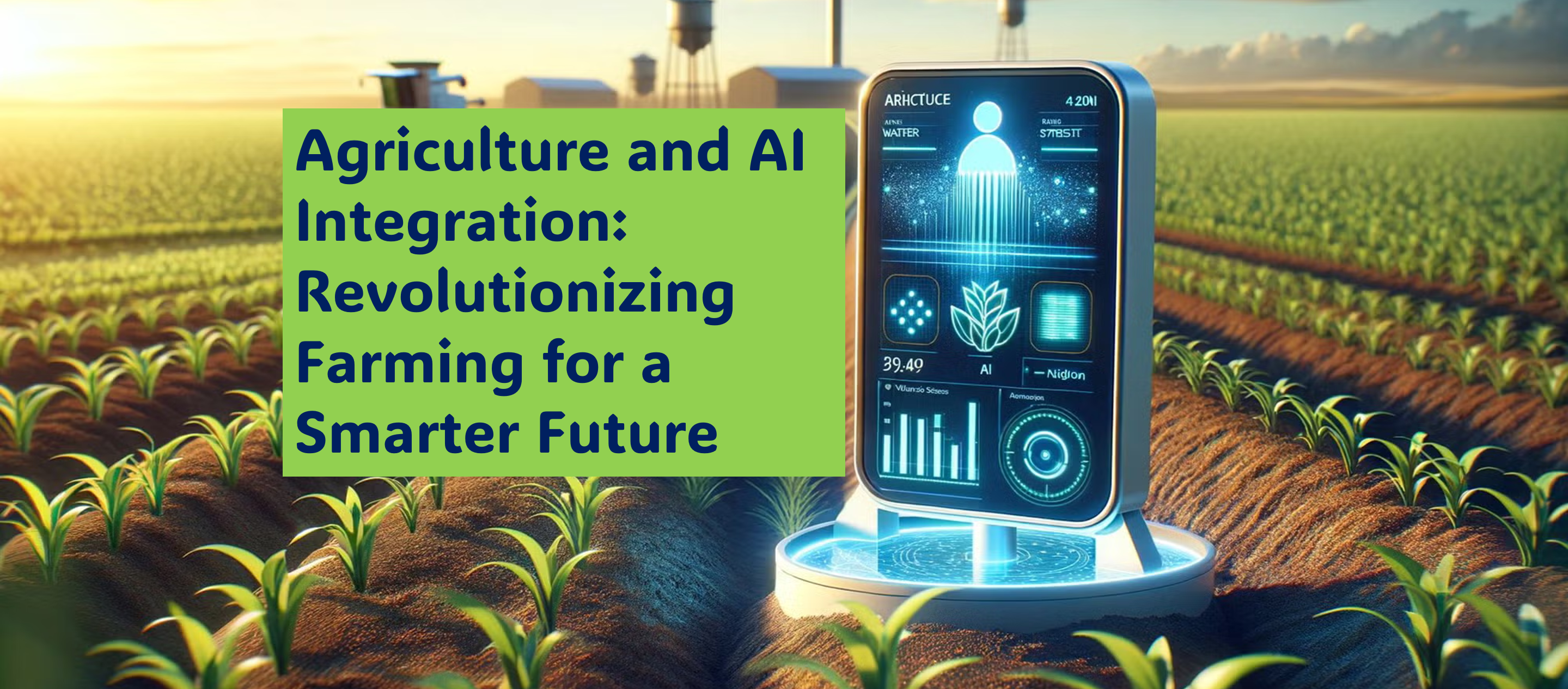The integration of Artificial Intelligence (AI) in agriculture is revolutionizing traditional farming methods, ushering in an era of efficiency, productivity and sustainability. From precision farming to predictive analytics, AI empowers farmers to make data-driven decisions, optimize resource usage and maximize crop yields. By leveraging AI, agriculture is becoming smarter, more resilient and better equipped to tackle global food security challenges.
In this blog, we will explore the role of AI in agriculture, its applications, benefits, challenges and future potential while shedding light on smart farming solutions powered by AI.
What is AI in Agriculture?
AI in agriculture refers to the application of advanced technologies such as machine learning, computer vision, and predictive analytics to enhance agricultural productivity and sustainability. AI-powered systems analyse data collected from sensors, drones and satellites, allowing farmers to make informed decisions and take proactive measures.
With a growing global population and an increasing demand for sustainable farming practices, AI in agriculture is emerging as a game-changer, optimizing farming techniques and ensuring better resource management.
Importance of AI in Agriculture
Agriculture and AI IntegrationApplications of AI in Agriculture
AI is transforming various aspects of agriculture through:
- Smart Farming with AI: Smart farming involves AI-powered solutions that enhance farm management by providing real-time data and analytics. Key applications include:
- Crop Monitoring: AI-powered drones and satellites capture real-time images to assess crop health and detect anomalies.
- Soil Analysis: AI-driven tools analyse soil quality and recommend the appropriate fertilizers for optimal plant growth.
- Irrigation Management: AI systems automate irrigation schedules based on weather conditions and soil moisture levels, ensuring efficient water usage.
- Precision Agriculture: Precision agriculture uses AI to provide targeted solutions, reducing waste and improving yields.
- Variable Rate Technology (VRT): AI sensors determine the precise amount of fertilizers or pesticides needed for different parts of a field.
- Yield Prediction: Machine learning models analyse historical and real-time data to forecast crop yields with high accuracy.
- Pest and Disease Detection: AI-powered systems help in early pest and disease detection, reducing crop loss.
- Image Recognition: AI detects pests and diseases using images captured by drones or mobile apps.
- Early Warning Systems: Predictive analytics warn farmers about potential outbreaks, enabling timely action.
- Automated Farm Machinery: Automation is revolutionizing farm operations, reducing dependency on manual labour.
- AI-Driven Tractors and Harvesters: Self-operating machines improve efficiency and reduce labour costs.
- Agricultural Robotics: AI-powered robots perform planting, weeding and harvesting with precision, enhancing productivity.
- Supply Chain Optimization: AI streamlines agricultural supply chains, improving market efficiency.
- Demand Forecasting: AI predicts market trends, enabling farmers to plan production accordingly.
- Inventory Management: AI-driven systems optimize stock levels, reducing waste and increasing profitability.
Benefits of AI in Agriculture:
The integration of AI in farming offers numerous advantages.
- Increased Productivity: AI-driven insights optimize resource allocation, maximizing crop yields.
- Cost Efficiency: Automation reduces labour costs and minimizes input wastage.
- Sustainability: AI promotes eco-friendly practices by reducing excessive use of chemicals and water.
- Enhanced Decision-Making: AI provides farmers with accurate, data-driven insights for better planning and execution.
Challenges of AI Integration in Agriculture
Despite its benefits, AI adoption in agriculture faces certain challenges:
- High Initial Investment: Advanced AI technologies can be costly, posing a challenge for small-scale farmers.
- Data Privacy Concerns: Agricultural data needs secure handling to prevent cyber threats.
- Lack of Technical Expertise: Farmers require training to effectively utilize AI tools.
- Infrastructure Limitations: Poor internet connectivity in rural areas can hinder AI adoption.
Future Trends in AI and Agriculture
The future of AI in agriculture holds immense promise with emerging technologies, including:
- AI-Powered Marketplaces: Intelligent platforms connecting farmers directly with buyers for fair trade.
- Blockchain Integration: Enhancing traceability and transparency in agricultural supply chains.
- IoT and AI Integration: Smart sensors providing real-time data for improved farm management.
- Advanced Robotics: AI-driven robots performing fully automated farming tasks.
Success Stories: AI Transforming Agriculture
Several companies are leading AI-driven agricultural innovations:
- Blue River Technology: Uses computer vision to identify and selectively spray weeds, reducing chemical use.
- Prospera: Analyses visual data to monitor crop health and optimize yield predictions.
- Farmers Business Network (FBN): Leverages AI for data-driven farm management and market intelligence.
Role of AI in Sustainable Agriculture
AI is playing a crucial role in promoting sustainability by:
- Reducing Chemical Usage: Precision farming minimizes pesticide and fertilizer application.
- Water Conservation: AI-driven irrigation systems optimize water use.
- Carbon Footprint Reduction: Efficient machinery lowers fuel consumption and emissions.
How to Implement AI in Farming?
Farmers can integrate AI into their operations through these steps:
- Needs Assessment: Identify challenges and objectives for AI adoption.
- Choosing the Right Technology: Select AI tools that align with farm requirements.
- Data Collection and Analysis: Gather relevant data for accurate AI predictions.
- Integration and Training: Implement AI solutions and provide necessary training to farm personnel.
- Continuous Monitoring and Evaluation: Regularly assess AI performance and make improvements.
Embracing AI for the Future of Farming
The role of AI in agriculture is crucial in addressing food security challenges, enhancing sustainability and optimizing resources. By adopting smart farming solutions, farmers can boost productivity, minimize environmental impact and improve profitability. As technology continues to advance, AI will undoubtedly shape the future of agriculture, making it more efficient, resilient and sustainable.
The future of farming is smart and AI is leading the way!
If you want a YouTube video to understand Agriculture and AI Integration in better way for your Agricultural competitive exams interview purpose. Let us know in the comments!
And Stay tuned with Agri Coaching Chandigarh Blogs for more informative content to ace your state and central-level Agricultural Exams.






